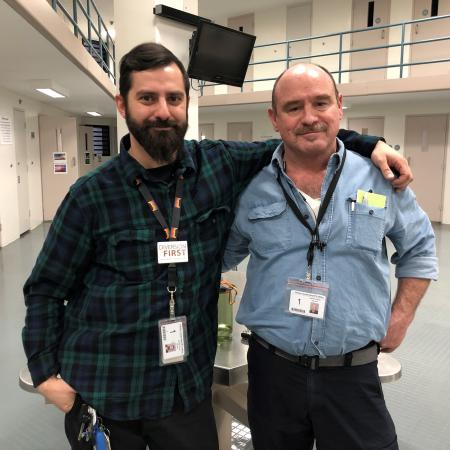January 16, 2019
“I learned how to have fun without the use of drugs, including alcohol,” said Nick Yacoub, a certified peer recovery specialist working in the Fairfax County Adult Detention Center’s addiction treatment and recovery program.

Yacoub started using drugs when he was 10 and said he “got into a lot of legal trouble.” At the age of 21, he found recovery as the result of an arrest. “Getting arrested saved my life,” he said, “but recovery made it a life worth living.”
Yacoub spent time in several residential treatment programs where he discovered the recovery community. Even after 17 months of continuous recovery, he still had to serve jail time in both Loudoun and Fairfax counties. “Serving a year and 10 days in jails was a gift,” he said. “It taught me that I could practice my recovery regardless of the circumstance.”
Yacoub insists that recovery is not about abstinence although it can be a foundation. He describes a substance use disorder as the thinking and behavior patterns that revolve around the substances. To recover, he had to change his lifestyle.
Since earning his bachelor’s degree in psychology from George Mason University in 2013, Yacoub has worked for the Fairfax-Falls Church Community Services Board in residential facilities. When the opportunity to work in the ADC came up, he was excited to start. “This is an environment I feel comfortable in, for better or worse,” Yacoub said with a chuckle.
Ed Howard, also a peer recovery specialist, shares responsibility with Yacoub for leading the unit. He is 21 years into recovery. “Different folks in recovery have different strengths,” said Howard. “I’m very strong with newcomers. I pick up on things from the participants that help me to help them.”
Howard describes his colleague Yacoub as very information driven. “He is a strong and knowledgeable source on ongoing help. I’m feelings oriented so we complement each other. I think that’s why we were both chosen for this program,” he said.
Howard believes recovery is possible for anyone whether it is a substance use disorder, mental illness or a traumatic background. “For recovery, there’s no going around, over or under it. There’s only going through it.”
Sheriff Stacey Kincaid spearheaded the jail-based recovery program in November 2018 as a therapeutic peer-led model. “It’s authentic,” she said. “The participants can relate to Ed and Nick because they have street credibility. They’ve been there, done that. Now, with many years of sustained recovery, their self-described mission is to serve others.”
Read past articles on the Sheriff's jail-based addiction treatment and recovery program:

